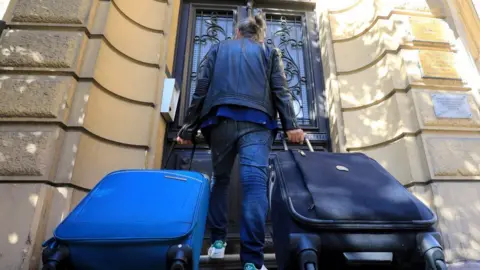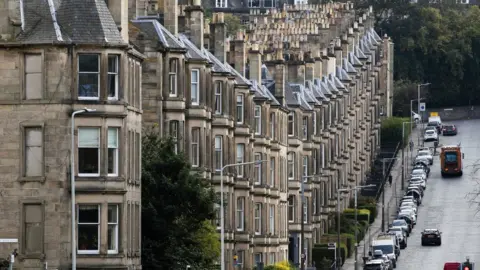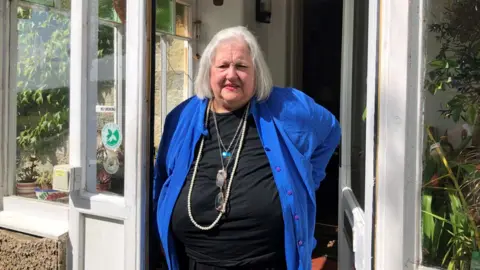Battle over short-term lets as licensing deadline nears
 PA Media
PA MediaAlmost two-thirds of Scottish B&B owners are considering shutting their doors over restrictions on short-term lets, according to a trade body.
The Scottish Bed and Breakfast Association (SBBA) has urged the first minister to delay the scheme, arguing it will hit tourism and jobs.
But Humza Yousaf has said the licensing regulations have public support and are the "right thing to do".
A new law requires short-let operators apply for a licence by 1 October.
Application fees vary between different councils but some property owners could face bills of several hundred pounds.
It is just the latest part of a long-running battle over what to do about the recent boom in homes being used for short-term letting.
What is the licensing scheme?
All short-term let (STL) accommodation must now have a licence and anyone failing to apply can be fined up to £2,500.
The Scottish government came up with the plan to deal with the growth of the STL market in hot spots such as Edinburgh.
Platforms such as Airbnb have proved popular with tourists wanting to visit the city. In 2019 there were 12,260 Airbnbs there, though that number dropped to 5,803 in 2021, after lockdown.
This boom brought a spate of complaints about anti-social behaviour from tenants and concerns that it was contributing to a lack of affordable housing in the city.
Similar concerns have been brought up concerning rural housing around the country.
While this is a national framework, licences are managed by councils and licence fees will vary depending on the local authority, size of property and type of let.
Research published last March by the Association of Scotland's Self-Caterers (ASSC) claimed that the estimated average licence fee in Scotland would be £514 per property for three years.
There are also some national requirements such as displaying energy performance ratings in adverts and having gas and electricity safety reports.
Who will be affected by it?
There are four types of licence covering different types of short let.
- Home sharing: For people who rent out all or part of their home while still living there.
- Home letting: Letting out all or part of your home while you are not there, such as when you are on holiday.
- Secondary letting: Letting a property which you own but do not stay in.
- Home letting and home sharing: This is when you let our part or all of your own home both while you are living there and also when you are not.
Those who already offer short-term lets must apply for a licence by 1 October and can continue to operate while they are waiting for a decision.
However, new hosts must now have a licence in place before offering the service and taking bookings.
The scheme also covers commercial accommodation including B&Bs, holiday caravans, self-catering lets, and managed apartments.
Who is exempt from the scheme?
Exemptions include "aparthotels". These are buildings which have multiple separate apartments managed and operated as a single business.
Also exempt are hotels, B&Bs and guest houses which are licenced to sell alcohol, and self-catering accommodation which is within the grounds of a licensed hotel.
You do not need a licence if you are offering a property for private long-term residential lets, or for social housing tenancies.
 PA Media
PA MediaWhy is it controversial?
Ministers have said the scheme recognises the importance to the economy of the STL sector as a means of offering flexible accommodation for tourists and workers.
However, they say they had to respond to public concerns about the impact of such lets on local communities, including affordable housing supply, noise and anti-social behaviour.
But the move has proven controversial within the tourism industry. It has already been delayed by six months and STL operators have been calling for a further delay amid claims that few of them have signed up with little over a month to go before the deadline.
Humza Yousaf has rejected the delay calls, pointing out there has already been one extension to the deadline. He said operators have had "plenty of time" to prepare their applications
The whole of Edinburgh is now a "control zone" for STLs, which imposes strict planning and licensing rules on the sector.
But some of the council's detailed plans for local implementation of the national scheme were ruled unlawful by a judge in June.
Landlords and STL operators took the council to court, saying its plans in effect banned small business owners without improving the housing crisis.
The case centred on a presumption against allowing entire flats within tenement blocks to be used as holiday lets unless their owners could demonstrate why they should be exempt.
Lord Braid ruled that the presumption was unlawful and that the lack of provision for temporary licences and requirement for some hosts to supply floor coverings went beyond the council's powers.
There have also been objections to "aparthotels" being exempt, on the basis these are usually owned by large multi-national companies and will be allowed to operate as normal while small business owners are punished.
This is not, however, just an Edinburgh issue.
A survey of members by the ASSC showed that 70% of operators are rural or island based, with 61% of respondents stating that it is their primary source of income.
These businesses can be vital to small communities but at the same time they are often accused of fuelling the housing shortages experienced in many parts of rural Scotland.
What happens next?
The latest intervention from the Scottish Bed and Breakfast Association included testimony from owner Avril Rennie.
Her business, Carlton Seamill in West Kilbride, won Bed and Breakfast of the Year at the 2023 Scottish Hospitality Awards.

She says the new licensing regime and costs make the future of her business "very uncertain".
"Now the STL legislation is putting everything I've done at risk. I may have to pack in doing B&B, sell up completely - and simply retire. I don't want to do that until old age makes retirement inevitable.
"I think all I can do is take things one day at a time. I hope and pray that common sense will prevail, perhaps at the 11th hour," she said.
But those who back licensing say there have been enough delays and it is time to change how we manage the STL sector.
Eilidh Keay of the tenants' union Living Rent Edinburgh said STLs are taking away valuable private rental stock and damaging communities.
"Our cities should be a place of homes not holiday lets and we should be putting the needs of residents first. The needs of tourists shouldn't always come first," she said.
